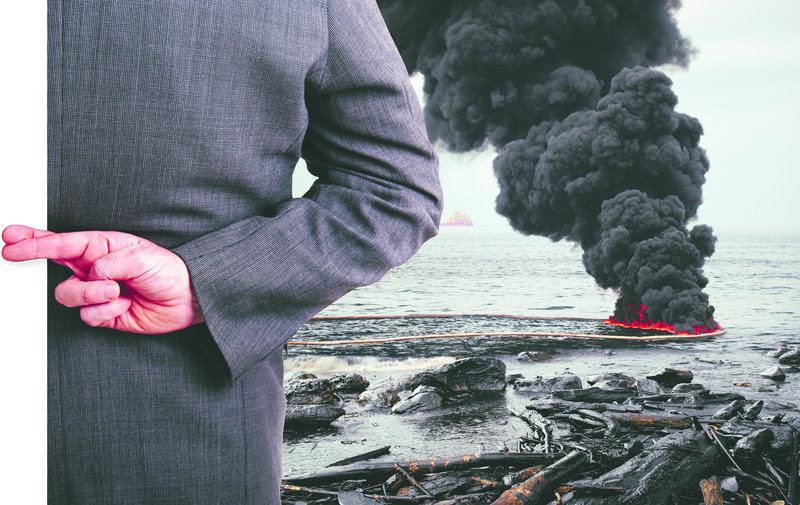ATLANTA – As thousands of gallons of crude oil undulated toward the five-state Gulf of Mexico coastline last week, BP’s chief executive assured shrimpers, fisherman and everyone else that his company takes full responsibility for the cleanup and any damages the spill inflicts.
If that pledge turns out like BP’s promise to fix hazards that set off a deadly 2005 Texas refinery explosion, then Louisiana fishermen should be considering another line of work, another way of life.
If the company is as helpful to those the Gulf disaster hurts as Exxon Mobil was to victims of the Exxon Valdez’s 11 million-gallon spill in Alaska, then BP will spend two decades in court fighting damage claims until it finds a court that will give it a break.
Oh, and don’t expect marine life to fully recover within the next 20 years. In Alaska’s Prince William Sound, some 23,000 gallons of toxic oil remain on its beaches, and oil gobules are still found in its waters. Fish and fowl have yet to return to pre-spill levels.
Whether the Deepwater Horizon explosion off the Louisiana coast last month will turn out to be more or less calamitous than Exxon Valdez’s grounding is too soon to tell. My guess is more. We do know it has already been deadly and that thousands of gallons of crude have been gushing into the water every day for more than two weeks with no clear way to stop it.
If fixing it costs a fraction of some predictions, which range into the tens of billions of dollars, BP’s own record makes it unlikely the company will make good on its promises.
In a 2005 settlement with the federal Occupational Safety and Health Administration, BP pledged to fix the multiple hazards that exploded part of its Texas City refinery and killed 15 people.
Four years later, OSHA alleged more than 700 safety breaches, hundreds of them violations of the 2005 agreement, and proposed a record $87.4 million fine.
BP says it’s been working as hard as it can to make the refinery safe and is appealing the OSHA findings.
That BP’s promises to do the right thing have fallen short should come as no surprise.
A corroded BP pipeline spilled more than 250,000 gallons of crude into Alaska’s Prudhoe Bay in 2006, followed by a second spill a few months later, which shut down the operation.
In 2000, BP admitted dumping hazardous wastes onto Alaska’s North Slope. In 2001, it vowed to clean up air emitted from eight of its refineries in a settlement with the Justice Department over Clean Air Act violations. And yet the Environmental Protection Agency cited one of those plants, in Indiana, for polluting the air again in 2007.
The company has been prosecuted for environmental crimes time and again. It has been sued by people who lost family members to BP’s carelessness and by workers hurt or sickened.
Each time, BP executives are so very sorry. Each time, they promise to install safety measures and to monitor the result and to never ever do such a thing again. And then it happens again.
BP gets green points for its investment in alternative, renewable energy sources. But that can’t make up for its dismal safety and environmental record at its other plants.
It isn’t fair to lay all of BP’s shameful history at the feet of Tony Hayward, who became chief executive in 2007. He has demonstrated a willingness to take safety and environmental concerns seriously, however short the effort at Texas City.
Hayward got the top job after running BP’s U.S. operations, a stint that began at essentially the same moment the pipeline break at Prudhoe Bay was found.
“That first week was probably the most difficult in my career,” Hayward told Fortune magazine in 2006. He surely wishes that were still true.
As difficult as the past 2½ weeks have been, he won’t get a rest after the Gulf leaks are plugged. Then he will have to show that he and his company will, at long last, make good on their promises to make things right after they have gone so very, very wrong. Again.
Ann Woolner is a Bloomberg News columnist.
Copy the Story Link
Send questions/comments to the editors.



Success. Please wait for the page to reload. If the page does not reload within 5 seconds, please refresh the page.
Enter your email and password to access comments.
Hi, to comment on stories you must . This profile is in addition to your subscription and website login.
Already have a commenting profile? .
Invalid username/password.
Please check your email to confirm and complete your registration.
Only subscribers are eligible to post comments. Please subscribe or login first for digital access. Here’s why.
Use the form below to reset your password. When you've submitted your account email, we will send an email with a reset code.